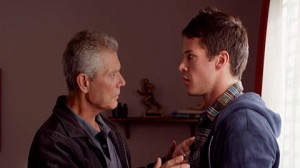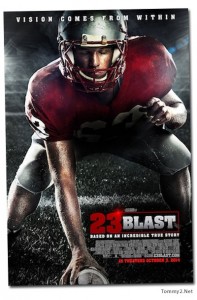Exodus: Gods and Kings
Posted on December 11, 2014 at 9:51 pm

The story of Exodus is central to three of the world’s most significant religions and one of the Bible’s most cinematic stories, with a flawed but charismatic hero and a stirring story of slaves seeking freedom. It has already been filmed at least eight times, from Veggie Tales’ Moe & The Big Exit to Cecil B. DeMille’s epic The Ten Commandments
, with Charlton Heston and Yul Brynner and Jeffrey Katzenberg’s animated The Prince of Egypt
. Now Ridley Scott, who showed his mastery of sword and sandal epics with Gladiator
has taken on the story with an all-star (but mostly non Middle-Eastern) cast and the latest 3D technology to really deliver on the special effects. Not so much on the theology part, though, or even the morality or meaning of it. Scott is clearly more interested in chases and battles and plagues, and so busy with it that he leaves out some of the story’s most important incidents. For example, instead of having to leave the palace because he killed an Egyptian who was beating a slave, Scott gives us a soapy story about Ramses’ jealousy. And we know Ramses is decadent because every time we see him, he’s eating.
The action and special effects work well, though. This is a two and a half hour movie that starts in the middle of the story and Scott keeps it moving. We first see Moses (Christian Bale) and Ramses (Joel Edgerton) as Seti (John Turturro), the Pharaoh, is giving them each a sword. At first, Ramses, Seti’s son, thinks he has been given the wrong one. But Seti has given them each other’s swords on purpose, to remind them that they must care for each other as they are about to go into battle. A seer has a prophesy: “In the battle, a leader will be saved and his savior will someday lead.” This inflames Ramses’ insecurity, especially when it comes true.
After Seti’s death, Ramses puts Moses in prison and tries to have him killed. Moses finds a home with a small community of shepherds and falls in love with Zipporah (María Valverde). Their life there is very sweet for nine years until he sees a burning bush and receives a message from God. Scott makes an imaginative choice here about portraying the Deity that I won’t give away, but I am still trying to decide how I feel about it. God tells him what he already knew in his heart. The Hebrews are his people and he cannot run away from his responsibility to help them find freedom. So he goes back to Memphis.
Bale holds the screen well as Moses, but Turturro, Kingsley, and Sigourney Weaver as Ramses’ mother do not have enough to do to. But there is a lot of time devoted to spectacle. Well past the two-hour mark, there are still 40 years of wandering in the desert and the Ten Commandments (twice) to get through, and they are sped through very quickly. The striking of the rock to get water, manna, the golden calf, and Moses not being permitted to enter the promised land are all skipped over. Two significant ideas that are included are Moses’ disagreements with God (and God’s approval of it) and the journey from the first scene, where Ramses believes in omens and faith and Moses believes in reason, to the end of the film, where they switch places.
Moses tells Ramses he must free the slaves and Ramses says the same thing that people have said throughout history when there is no possible moral justification for their position. He says that it is not economically feasible and will take a long time. Moses, trained as a general, gets the Hebrews to attack the Egyptians’ supply chain, but God gets impatient and steps in with the plagues, which are very vivid and rather disturbing. After the death of the Egyptian first-born children, including his own son, Ramses tells the Hebrews to go. But then he and his army ride after them, until the miracle at the Red Sea, very impressively staged. But, again, the focus is shifted from the story of the Exodus to much less interesting battle between two cousins raised as brothers.
The visual scope here is impressive. There just isn’t much soul.
Parents should know that this movie includes Biblical themes including slavery, plagues and other kinds of peril and abuse, extensive peril and violence, battles, many characters injured and killed including children, and disturbing scenes with dismemberment and dead bodies.
Family discussion: How did being raised as a prince affect the way Moses saw himself and his role? How was he affected by learning the story of his birth? Why does he object to the plagues?
If you like this, try: “The Ten Commandments” with Charlton Heston


